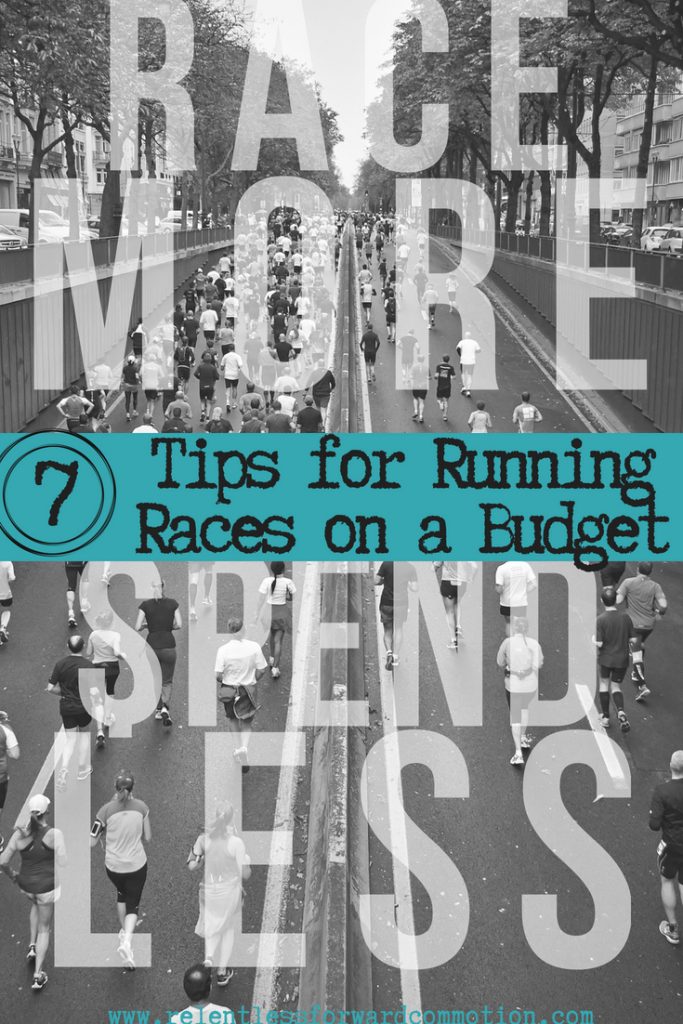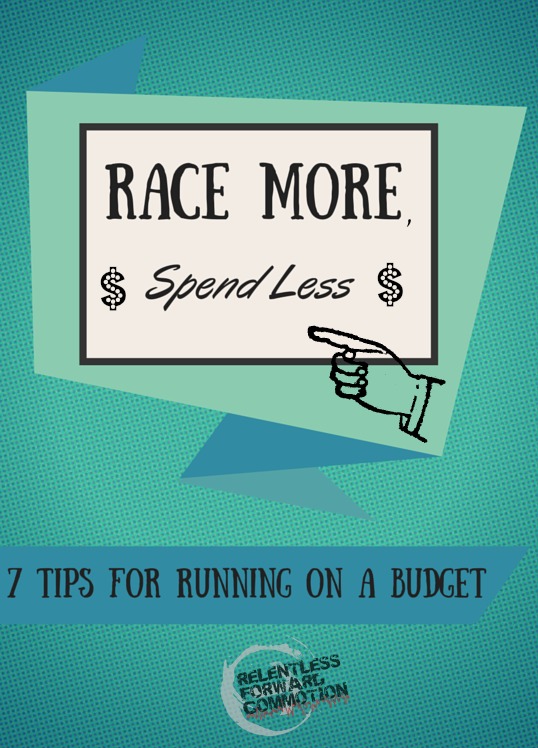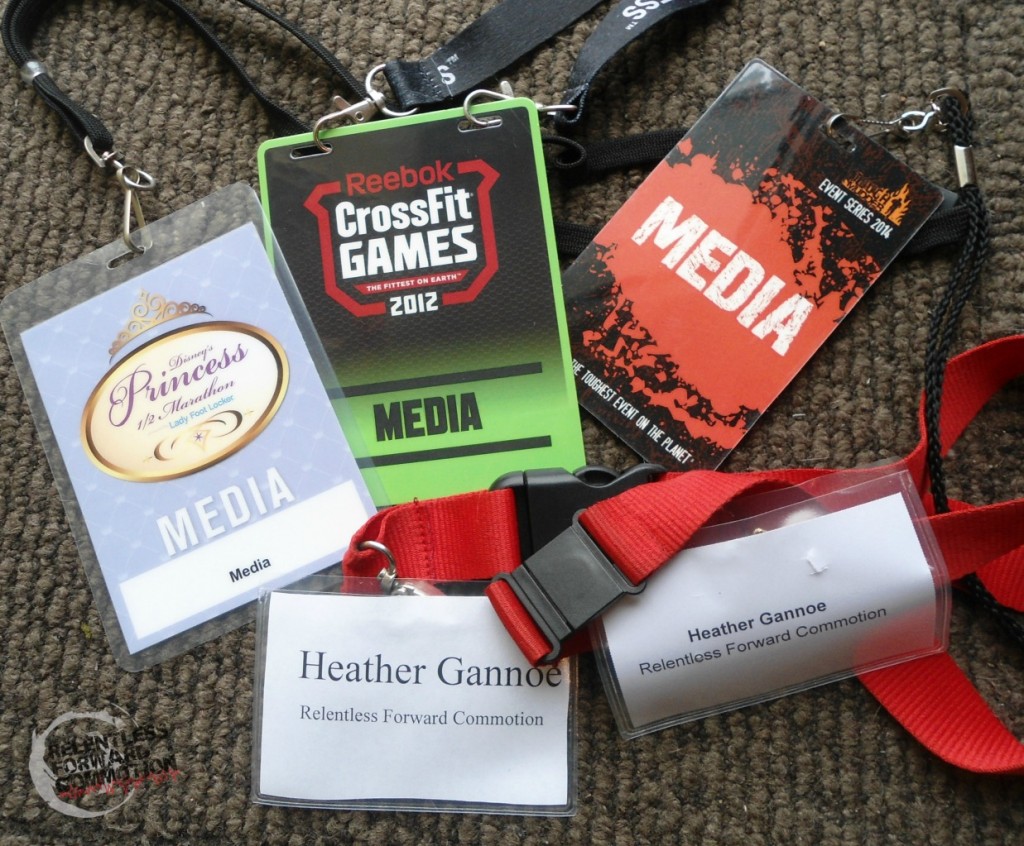Last Updated on March 13, 2022 by Heather Hart, ACSM EP, CSCS
In my opinion, the biggest farce in the running world is the misconception that it is an inexpensive sport. I can almost hear my fellow runners laughing along with me. Sure, if you are a recreational weekend warrior who is happy to throw on a pair of sweatpants and your 3 year old Nike sneakers, running can be an inexpensive sport. But as soon as the “running bug” takes hold…watch out. Sneakers, which need to be replaced every 300-500 miles (which for most runners, works out to about 6 months or less), cost upwards of $120 or more. Running clothes, even the inexpensive ones, still aren’t that cheap, and you need a variety of them for all seasons. Want to know how fast or far you are going? Of course you do…tack on another $200 or more for a GPS watch.
And then, my friends, there is racing.
Sure, not every runner has the desire to race, but many of us do. The thrill of the competition, crowds, and a shiny medal at the finish line can certainly become addicting. Not only is the race experience enjoyable, but it can be a huge motivating factor in helping us continue training all year long. But it certainly doesn’t come cheap. In the span of the short 8 years that I’ve been running, I’ve seen 5K registration prices jump from an average of $15 or so to some reaching nearly $60. Marathons? $100+, easily. Obstacle course races? Some of the big ones often push $200. Add in travel and sometimes lodging costs, and even a modest race calendar can break the bank pretty quickly.
But not all hope is lost: with a moderate amount of planning, racing can be done on an affordable budget. In the past 8 years, I’ve been fortunate enough to complete nearly 100 races on a budget of little to nothing. Here are the tricks and tips I’ve learned along the way regarding how to race on a budget:
1) Plan Ahead & Prioritize your Races
Oh being a grown up sucks sometimes! If you are anything like me, you want to do ALL of the races, ALL of the time. But due to responsibilities, time, financial constraints, running all of the races isn’t possible for the majority of us. Don’t let FOMO get the best of you. Before your next season starts, sit down and write a list of what races you’d like to do. Then prioritize them, (realistically of course; for example, the Everest Marathon is #1 on my bucket list, but that $3,000 flight to Kathmandu isn’t going to happen anytime soon), by “A” races, meaning the ones you want to do the most and are most likely to make happen, “B” races, your backup or training races, and “C” races…the ones that would be nice but aren’t really that important to you. Knowing far ahead of time where your racing priorities stand helps you to financially prepare for those really important races. Which leads us to point #2…
2)Purchase your Registration Early
Race directors often steeply discount entry fees when registration first opens. There are a number of reasons for this, but the basic concept is that a race directors job becomes slightly easier when they know they have a full race field, and can predict the number of participants well in advance of the actual race. Thus, offering discounted race registrations encourages runners to sign up early. Yes, it can be hard to plan very far ahead into the future, but having that priority list from step #1 makes this step SIGNIFICANTLY easier. And the “sign up early technique can save you anywhere from $10 to even $100 or more off of race day registration fees.
3) Volunteer
Many of the larger race organizations will trade you a full shift of volunteering for a free or significantly discounted race entry. Some companies, like Spartan Race, will allow you to volunteer in the morning and race later in the afternoon. Others will allow you to volunteer one year and race the next. Still others will allow a family member of yours to volunteer in exchange for your race entry. There is a wide variety of volunteer positions needed at every event, from registration, to aid stations, to finish line duties, and so much more. Keep in mind that volunteering isn’t always limited to race day: jobs like course set up or breakdown, advertising at local expos, or even stuffing race packets need to be done outside of race day itself. When in doubt, ask. Unfortunately, many race directors have a hard time filling volunteer slots with dependable volunteers, and would likely be happy to exchange an entry or discounted entry for guaranteed good help on race day.

Volunteering at the 2014 Summer Death Race. photo credit: Big AP Photography
3 a) Volunteer as a Pace Group Leader. This is specific job, and must be done by a dependable, experienced runner who is willing to sacrifice their race for the experience of helping other people reach their own race day goal. But, if you can run a specific pace like clock work, and enjoy helping other people, chances are you can race for free as a pace group leader.
4) Race Local
Local, smaller races are often significantly less expensive than some of the bigger, national race companies. Further racing local helps support your local running community, and sometimes even local charities and the economy. That said, racing some of the bigger events locally will also save you money, in the form of both travel costs, and not needing to spend the night in a hotel. Geoff and I try to plan our entire race season around a 2 hour radius of our home. That completely eliminates the obvious costs of flights, cuts back on gas costs, and means we can safely make it to and from the race in one day, eliminating hotel costs.

5) Bring Friends, Share Costs.
If you do decide to travel far from home: bring friends. Share the cost of travel by carpooling. Bonus good karma points: you are helping the environment as well by keeping less cars off the road. If you choose to stay in a hotel, don’t be afraid to bunk up. A $100 a night hotel room can be cut down to $25 per person if you aren’t afraid to cuddle. (I’m serious and joking at the same time, but I sure do love my running friends). Further, look into alternative lodging arrangements: the large upfront cost of a condominium is actually not so expensive when you consider the number of rooms, beds, even sleeper sofas, and how many running friends can fit in the condo and thus, split the cost. Lastly, if you know a friend in or near the town where you will be racing: bring your sleeping bag. Ask first if you can spend the night, of course, or that night could be a little awkward.

Racing is more fun with friends! 2914 Seven Sisters Trail Race
6) Pack your food
It may seem innocent enough, but those snacks from the gas station and road trip bagels or coffees from Dunkin Donuts (hey, New England!) can add up fast. Especially when you are a runner, and perpetually hungry (that can’t be just me, right?) Plan ahead and pack food. Road trip snacks, such as chips and bottled water, cost a fraction as much if you buy them in larger quantities at a regular grocery store, rather than single serving sizes at a gas station or convenience store.
And how about meals? That $15-$20 pre race pasta dinner or pizza can be cut down to $5 per person or less if you bring your own. Sure it’s not as fun as going to out dinner, but once you add in drinks and gratuity, you could be spending a huge chunk of money on a single meal. Check ahead with your hotel to see if they have a kitchenette (or hopefully a full kitchen, if you are staying in a condo). If not, bring a healthy meal that can be eaten cold.
7) Become an Affiliate
Is there a race series you can’t get enough of? See if they offer an affiliate program. If you enjoy the race series that much, chances are you have already told all of your friends and family about it, and encouraged them to sign up. Why not get credit for it? Often referred to as a “street team” or “ambassador program”, affiliates are given credit for every person they get to sign up for the race. These credits in turn allow you to race for free.
8) Start a semi-successful blog
OK I know this one isn’t for everyone, but I’d be lying if I didn’t admit that this is how I afford to race as much as I do. Word of mouth recommendations take on a whole new meaning in the social media world. Thorough (and hopefully, positive) race reviews are advertising gold to race directors, and they are often more than happy to exchange a media race entry for your first hand accounts of your race experience. It’s a lot of hard work, but if you are passionate about your sport, writing, and sharing your experiences with others, it is completely worth it.
So there you have it, 7 (plus some bonus) tips to racing more while spending less. It takes extra planning, but the reward of adding experiences and races to your resume is worth the extra work. Have some tips to add? Please comment below!
Heather Hart is an ACSM certified Exercise Physiologist, NSCA Certified Strength and Conditioning Specialist (CSCS), UESCA certified Ultrarunning Coach, RRCA certified Running Coach, co-founder of Hart Strength and Endurance Coaching, and creator of this site, Relentless Forward Commotion. She is a mom of two teen boys, and has been running and racing distances of 5K to 100+ miles for over a decade. Heather has been writing and encouraging others to find a love for fitness and movement since 2009.



Betsy Moats (@WarriorBetsy)
I was definitely laughing right along with you lol! Great tips Heather!
peachylau
These are great tips 🙂
Heather
thank you ! 🙂
Cynthia @ You Signed Up For WHAT?!
Great tips! I am trying to take advantage of early registration prices now for triathlons for 2015, since prices just go up and up after the new year!
Heather
Good for you for planning ahead! Now I need to take my own advice and think about 2015, haha
TeamFitMommy
That is a great list. Part of the reasons I haven’t done many races is the cost. Like you said running for fun on the weekends is one thing… Being a competitive runner is something else. It’s not cheap but you have given some great ways to make it worth it!
Heather
I’m sure the cost inhibits a lot of people from racing often! It certainly isn’t cheap!
Heidi @BananaBuzzbomb
I used to sign up WAY in advance but got away from that due to having a couple DNS due to injuries. Not to mention it messes with my brain. Now I oftentimes sign up a week or two in advance. Not to savvy for saving money but then again I also don’t race all that much.
Heather
I will admit that back in the day I used to get overzealous with signing up for races, usually far in advance, and thus had my share of DNS’s and lost $$. These days I have to pick and choose carefully, so thankfully I make it to most of them!
Leanne
Love the suggestions, I already do most but never thought of the media part 🙂 AND yes, HA HA to running is cheap!
Heather
It’s funny, isn’t it ? 🙂
Christopher Bustard
Fatasses are good too!
Heather
Absolutely!
MCM Mama (@mcmmama)
Another tip: Make it part of your vacations. My husband loves to travel and is fine with me taking one morning to run a race (or 5 or 6, ahem), so I tack a race onto pretty much every vacation we do. And since we plan vacations pretty early, I also register early.
Off to approach one of my favorite races for a free entry in return for blogging…
Kyle Kranz
I’d also say is to use the race registration insurance, if available. Last time I did this, it was $7 and if I would have missed the event I could have gotten all the registration back except that $7. That’s worth it if I’m signing up 4-5 months out!
Heather
That is an excellent suggestion! I haven’t seen too many races offer insurance, but I hope this becomes a regular thing!
Eat Pray Run, DC
excellent tips! i’m pinning this post 🙂 and yep, running ain’t free!
araekeech
Great topic for a post! With two kiddos now I can’t just throw down what ever I want on racing anymore (which includes long course triathlons which are ridiculously expensive!) I already implement most of these but did find a couple few tips to give a try, thanks for sharing!
Amy Will
Great tips for racing on a budget! I don’t have a thing to add! I think it’s so cool that you can get racing deals for writing a race report 🙂 That’s an awesome exchange, win-win!
Amy @ http://www.livinglifetruth.com/
runnipt6
I would love to race more often but have held myself back because of the cost. I’m one of those that will buy things for everyone else but when it comes to buying something for myself, I find a reason not to. I really have to stop doing that!! I’m going to use these tips, too, to start getting into racing for less! Thanks!